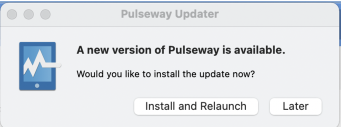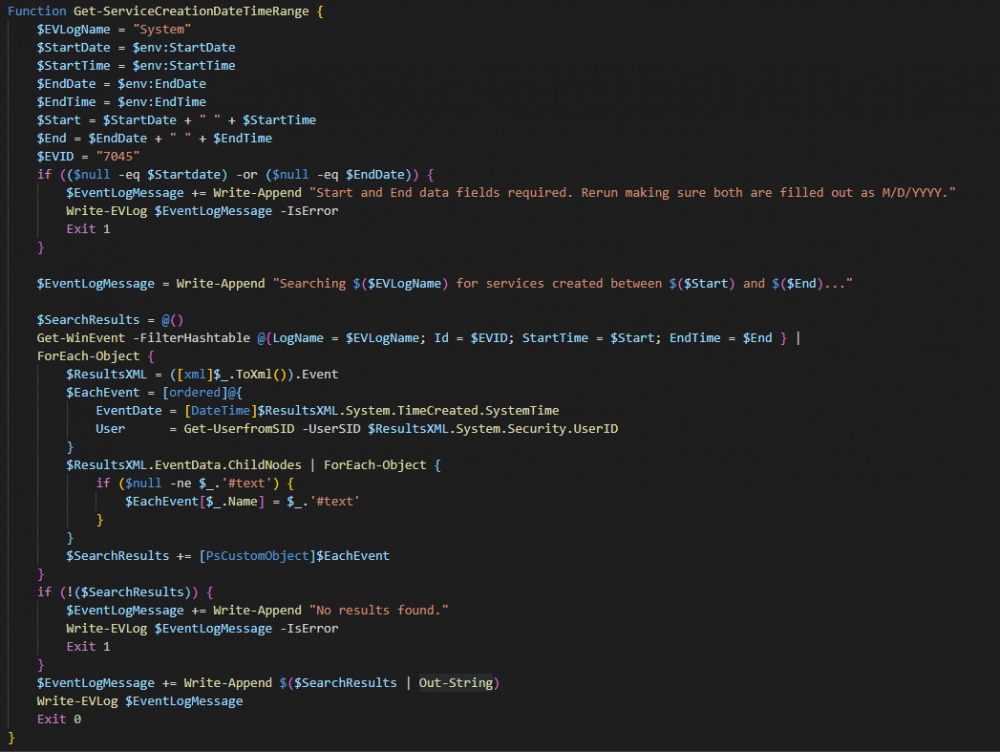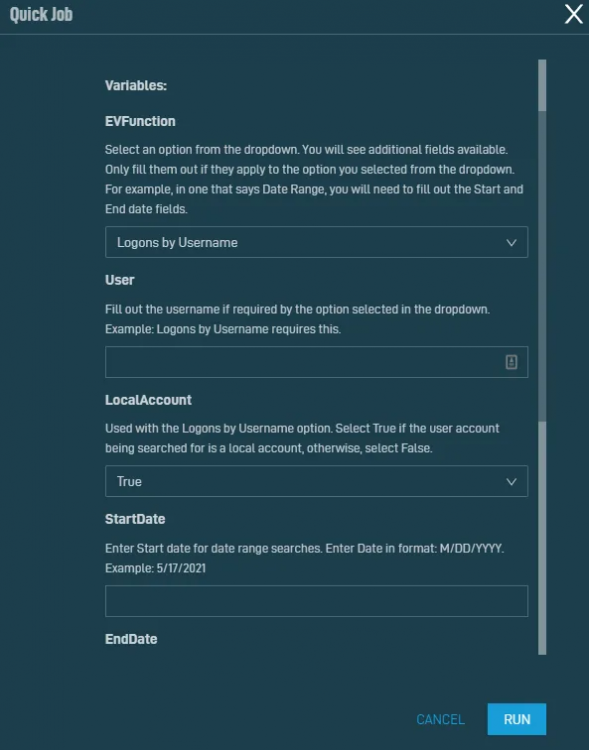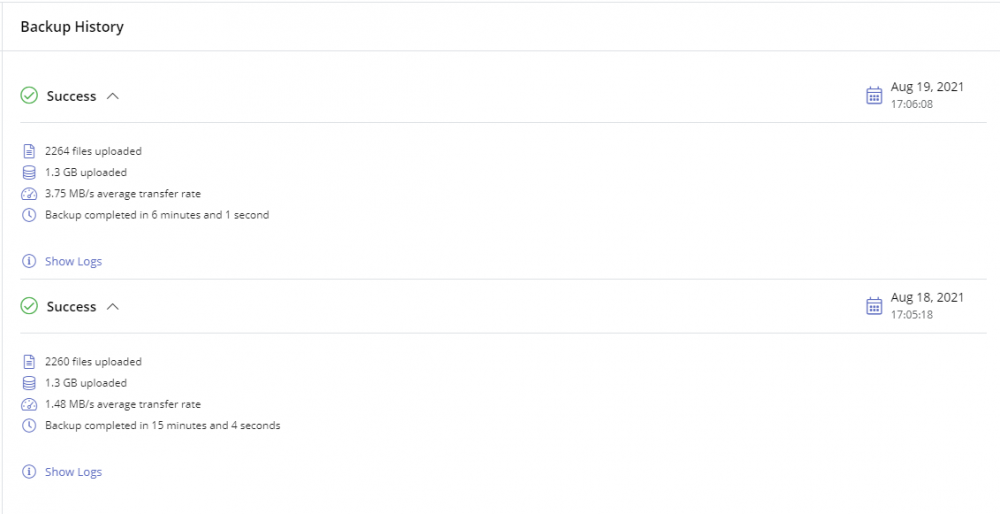Search the Community
Showing results for tags 'feature request'.
Found 215 results
-
Maintenance Mode - Trigger Event Log
Hi Team, Can we have an event log for when Maint mode is triggered or removed? Not a bad thing to have when tracking a problem but also we can then use things like automations based on events. It would be good if it said which user triggered it but even just a simple maint mode on / off with a standard event ID would be amazing. Use Case: Medium to large organisations have lots of people managing servers even third parties. By seeing who / when a device was put into maint mode it would help track changes. Another key use is that if i can trigger an automation based on Pulseway maint mode i can have it do various things such as send an email to a specific address to silence alerts in third party systems based on this one maint mode.
-
Automatic update for Pulseway on mac
Is there a way to make Pulseway agent update automatically on mac instead of asking the user to Install and Relaunch?
-
Teams Channel Integration
Pulseway has had Slack Integration for a long time now but those of us who use Microsoft Teams get no love or have to run Slack just for alerts. Please look at adding Teams Channel Integration also.
-
Autoresolve tickets after followups have been completed
Hi, Is there a way where the tickets can be auto-resolved after follow-ups have been made or let's say within 7 days of ticket opening? Also if it can be re-opened later without affecting SLAs upon client's request? Any help or advise would be appreciated.
-
Custom Type URL - Hyperlink or Button
We're looking to leverage the custom fields to add links for external documentation specific to the account or project to records in Pulseway PSA. The only data type that seem suited is "Free text" but then you need to copy paste the link to view it. Can we get an option for URL that creates a hyperlink or button?
- Additional Date Codes
- See latest ticket update on title hover
-
Change Status / Assignee from Queue / View
I'd like to request that when in a queue or a view, we are able to change status / assign tickets from the queue / views dashboard by left clicking the relevant section, and being able to change it from here, for instance left clicking the status, and it bring a drop down of all ticket statuses so I can then change it, or left clicking assignee, and being able to add an assignee straight from there. In the morning we typically have a number of tickets in the helpdesk, so being able to quickly view the ticket title normally enables me to then be able to close / assign tickets there and then, without having to go into each individual ticket If you require more info, please don't hesitate to let me know
- Create Tasks unrelated to a project and allow them to be picked up/assigned direct through tasks in all tasks view.
-
Allow time entry to be created unrelated to task or project
We have need to be able to create a time entry related to administrative or etc items that do not have an associated task or project and do not wnat to have to create and or leave a task/project open indefinitely for administrative or etc processes, but would like to be able to track that time.
-
See existing client tickets when opening a new ticket.
We would like to see the last few tickets for a client when entering a new ticket. When a client calls, we ask if they have a ticket, we start a new ticket and help the client. We find that we end up with multiple duplicate tickets for the same issue. (ie. Client sends in a ticket via email, then calls the service desk as they are in a rush.) In other ticket systems we have used, when entering a ticket, we get a popup showing the last X (normally 5) tickets for that company and user. Ie. We enter the company name, the popup (side bar) shows the last 5 tickets for this company. Ie. Then when we choose the user we are working with, the popup (side bar) filters the company showing only the tickets for this specific user.
-
Intgration with Work Order Apps
We are looking to use PSA but we need a better way of making tickets that as easy to use for our techs on the road. Features such as Location based customer selection for Ad-Hoc tickets Adding signatures to a ticket directly from the app. Allowing the tech to fill in Start and end time for tickets nut just start time and duration. Adding pictures directly from the app. Or a way to do this from different apps probably by using PSA API to send the data to Pulseway. With enough information we're willing to code the app ourselves if this is possible.
-
Asset info visible for offline systems
Instead of performing necromancy on this older thread, I will raise this question again. Why can we not see asset info for offline systems? I know this is available through reports, but that's a ton of steps to go through when it's already readily available offline (since the Reports can search it) and it should just be visible. This has been a big gotcha (along with not seeing internal IPs without running a report or being able to copy/paste in remote sessions) as we moved from another tool to Pulseway. I've seen more than one thread about this, and each time the response is 'run a report'. Please stop brushing it off as 'RTFM' and provide the functionality we're asking for. Thank you.
-
Search service ticket via time entries.
Need to search ticket to find work done that is posted in tech notes. We are having issues finding work performed for clients in the PSA search. The issue is that the ticket “Title” and “Details” do not always include the data you are searching for. (ie. When working with a supplier, we get info from them (ticket numbers or data) that we put in a ticket and can not search for.) It would be nice to also search the “Time Logs” – Notes and Internal Notes fields for key words to find data.
-
Workflows
We'd like to use workflows when a specific eventlog item is triggered. Now everything will send by email if you use workflows. + It is possible to send an email when a new system is registerd. It would be nice if you can also have a item in the workflow which states the total of the specified group. Thanks
-
Limit Ticket Templates to Specific Users
Hello, I need the ability to set up ticket templates that only a few members of my organisation can access. For example a "New Starter" or "Leaver" template pre-populates loads of info, saving time for my admin team, but if I give everyone in the organisation access to these templates they will do what people do and attempt to circumvent the admin team. Is this something we can see in the near future? Seems like a simple enough thing to implement. You already have a couple "share with..." options on the template creator menu, perhaps we just expand on this a bit? Thanks
-
Pulseway Improvements
Let me start off by saying this is not meant with any kind of hate or ill will. I very much love the Pulseway product overall, and I have been using it for a quite a number of years now. I very much want to see Pulseway continue to improve and catch up to a lot of the other RMMs out there by addressing some obvious "misses" with certain aspects of the software. This is going to be a bit of a novel but I hope the Pulseway staff and the community give it a read and feel free to comment, add suggestions, etc. The below items are too much to put into a bunch of separate feature requests. I apologize in advance if this is too much in one spot Interface/Web UI: Ability to completely remove or hide default scripts. Should also be able to delete individual ones within the default section. Ability to adjust script level permissions. There are some scripts I have written such as an MDM remote wipe type script that I want to be able to access within Pulseway if needed, or one of my higher tiered consultants but not my lower tier. I should be able to assign some sort of permissions to scripts to hide/show them based on security group, level, or team. A full inventory of the machine should be performed by the agent and visible in the web portal. This is a basic function of every other RMM I've used. I should be able to see all services on the machine, just like Pulseway looks at all applications installed. Services should then be selectable to be managed or not, or allow the ability to manage them right from that screen. Windows Updates - We should be able to easily see a list of installed updates on the machine without having to go back through Patch Policy History. The list could easily be populated on the Windows Updates section that Pulseway currently has. Dashboard - Needs more adjustable widgets. Patch status should be available as a dashboard widget with the ability to drill down to site/customer or filter for those things when creating the widget. PowerShell Console - Should be able to press up or some other key to be able to access, select previous inputs from that active session. Scopes - From the Scopes creation page, we should be able to then click on the Scope and see all the machines that the Scope includes. This would be a much easier and faster way then having to go to Systems and then select the Scope and drill down that way. Exclusions - We are unable to create exclusions for alerts. The answer is to move the machine to it's own group, and apply a new policy to that machine. This is certainly not ideal as 1, if you logically group your machines together, then splitting one out is a mess and even more importantly, then more policies created, the more you have to worry about going in and updating them when you want to change 1 thing. The less policies that have to be maintained, the better. Scripting: Input Variables - My single biggest issue with scripting currently is the lack of usability with the current custom input fields. It takes more time to click add/edit and input what is needed into the UI, then it does for me to just declare the same variables at the start of my script when writing them. Have script input variables work as environment variables, and they can be filled in at the time of script run. So if I have script to search for something by date range, I can create 2 input variables, Start & End, and leave them blank. When I got to run the script, it pops up a window with the available custom input variables allowing me to fill them in at that time. Here is an example of a popup window at the time of run for another RMM tool I've used. All these variables are declared in the script as $env:customvariablename, and then inside the RMM portal, at the script creation screen, they are entered in, much like you can with Pulseway, and you can select the type of variable. Variable value, Boolean, selection (dropdown). Whatever is selected/inputted at the time of ran is simply passed to the $env:customvariablename that corresponds to that input variable. I've shown the 3 areas of how this works to show the complete idea behind this in the attachments. Site Variables - Pretty much the same concept as above, except these are created at the site (customer) level instead of the script level. They are called in the same fashion as above. This would allow for much greater flexibly around scripting as many clients have license specific software that needs to be installed and being able to set a site(customer) level variable that gets pulled automatically when the script runs, would allow for 1 script to be made and ran across multiple clients at a time without having to edit the script or make copies with the unique license key for each. It would simply read from the site variable when running and insert whatever is in that site variable field. Output of scripts (the content) in the push notification or email alert. If I schedule a task to run on a recurring basis and I get a failure notification, being able to see why is incredible helpful. Or, even if it's a success, there are plenty of use cases why seeing the output is needed. If I'm running a script to collect xyz info across multiple systems, being able to easily see that in a central spot on the notification or email is imperative. I shouldn't have to log into Pulseway and check each machine or check the task and look through the report. Tasks - We should have the ability to schedule tasks to run much more frequently that once per day. I would like the ability to run a custom script that checks for something specific let's say, once an hour, which then writes to a custom event log that I then have Pulseway set up to trigger an alert from. This would be helpful in creating plenty of custom alerts based on Event Log errors but once a day is not frequent enough in some cases. The ability to select multiple machines and run a script against them on the fly without having to tag them or create a scope and run a task. When a task is completed and you are viewing the results, it would be awesome if you could click the machine and go right to it from there. It's a little cumbersome to be viewing the results of a task, specifically looking at ones that failed, and then having to click out of the report and go drill down to each failed machine. Workflows As I understand it, the entire workflow idea works around something that generates a notification. This creates a big issue with workflows in the sense that, we are limited to whatever Pulseway deems an acceptable "condition" or filter. What would make workflows amazing, would be essentially turning them into "custom monitors". What I mean by that is I create a script that let's say reads some random programs event log because my customer needs to know when this particular software generates a specific error, (and no, it doesn't write this error to any event log). There is no built in way to approach this with Pulseway. If I could simply create a workflow and choose to run a script as the initial item, and then based on the exit code of that script, do other things from run a script to fix, generate an alert to my team so someone can go in and look at what is causing the error and resolve it, etc. I could apply that workflow to any systems I wanted, and set it to run every 10 minutes, an hour, whatever, and when it detects the event, again, based on how the script was written, it triggers the workflow or the alert. As in the example above, if I set it to run every 30 minutes and look for "if error exists", if it does, it then creates an alert so that myself and my team get notified. But it would also allow the workflow to perform additional steps as remediation if desired. Another useful example of what I'm trying to explain, is perhaps I want to perform a certain set of steps based on a tag setup in Pulseway. I should be able to set up a workflow against a tag or against a scope and set it to run every so often. When a machine is then given that "tag" the workflow triggers and performs the steps assigned. This goes along with 4 under scripting. In the same vein, workflows should be triggerable off the result of a script. In other words, I shouldn't HAVE to make it an event log entry. It would be great if I could set up a script via a task, and then set a workflow to check results of that script and allow me to choose either to alert or trigger a workflow on either a success of failure, whichever I wanted at that time. Cloud Backup: I would LOVE to use Pulseway's built in cloud backup, but there are just too many flaws / missing items in it currently. Scheduling - The only current options are every day, every 2, or every 3 days. All backup solutions I've ever seen, give you the ability to select which day(s) you want the backup to run, be it every Monday, or any multiple combination of days. We should also have the ability to select the TIME the backup will take place. Right now, it uses the time the backup job was created, so if I want a job to happen at 2 AM, I have to stay up until 2 AM to schedule that job for the first time. This is a very shocking miss on the backup front. Ability to exclude certain file types (by extension) is needed. Notification on job success or job failure is a MUST, not how it current is where it notifies you once it reaches below a targeted % range. The ability to see the used space. Since your cloud backup works off either 500GB or 1TB licenses, we need to be able to see how much space is current in use per machine so we can plan to take the needed action should the backups start approaching the limit. A report on the files backed up. Since this is a file only backup type, it's imperative to be able to see a list of all files backed up during the job, and if they were successful, failed, or skipped. The ability to specify if the backup is considered a failure based on % of failed or skipped files is also needed. For example, if I'm targeting 1000 files, perhaps 5 failed isn't a concern to me, but if 300 fail, that's a failed backup job IMO. Therefore, having the ability to say if 10% (or whatever amount I want) of files fail to backup, the job is considered failed. In general, during my demo of this, I've had some concerns which your staff did witness directly: The next backup date seems to fluctuate between the current day and next day if you sit that the backup status screen of Pulseway. The initial dig into a backup job, showed folders that I had excluded, were still present and you could drill down. However, after mounting a recovery to explore, the interface then hid all the folders not backed up. Concerning if it's collecting any data from folders I specifically didn't include in the target paths. You can see from the image below, it backed up 2 days in a row, almost the exact same amount of files and used the same amount of space. This is a test VM which had no changes in the test target directories, and yet the 2nd day it did what appears to be a full backup again. Subsequent days seem to have improved and the file count went down to a more expected level. Here are some feature requests I submitted around some of the points above: https://pulseway.featureupvote.com/suggestions/189283/more-robust-input-and-site-variables https://pulseway.featureupvote.com/suggestions/189917/patch-status-dashboard-widget https://pulseway.featureupvote.com/suggestions/214566/more-flexible-task-scheduling https://pulseway.featureupvote.com/suggestions/217128/exclusions https://pulseway.featureupvote.com/suggestions/202867/attach-files-to-scripts https://pulseway.featureupvote.com/suggestions/202092/monitor-services-through-portal https://pulseway.featureupvote.com/suggestions/203512/system-type-as-workflow-condition
-
Auto clearing alerts
Hey guys! I think Pulseway would be even better if the alerts would clear themselves when resolved.. For example, a server with available windows updates will reboot during our custom maintenance window but the alert will stay until I manually clear it in either the webGUI or the Dashboard app. Those kind of alerts along with cpu spikes, short memory outtage etc are more like "white noise" in the monitoring for me and I'd like to focus on alerts where a proper action is needed in order to resolve. To build further on this idea an even better improvement would be to tie alerts to scripts, so if Alert X is triggered, script Y will run and Alert X will be cleared. Let me know what you think! // Martin
-
Client Portal User Authentication Choices/Azure AD
Chris/Paul/Cliff, Thanks for all the work you guys are doing to make PSA usable in a production environment. I love the latest improvements. I have a priority request regarding Client Portal authentication. I see that AuthAnvil is supported. Can you guys please look at adding 365 Azure AD integration as well? There is no way my client end-users are going to remember a separate password for their PSA login to open and view tickets. We really want to push them to it, but its not going be useful. I image that Azure AD would be the most common platform for most companies. In the meantime, can we have a way to manually set a secure password for each user for Client Portal? A work around would be to set a secure password for each user and then distribute it to the users. Without one of these options, we just don't see the Client Portal for end users accessible.
-
Additional Options for Custom Windows Agent Installer
It would be great (save me a lot of time) if, when downloading the custom Windows agent installer, there was an option to specify if the installer should create shortcuts or not. IOW, in addition to selecting the organization, site and agent group, there would also be an option (true/false) for "create program shortcuts" (or similar).
-
FEATURE REQUEST : Readout ESXi Hardware/Health status
You tell us we can monitor everything on any device from anywhere.. But with the vmware addon you cannot even readout the hardware/health status of esx(i) which is very simple because the API is already there.. you just have to read it out.. that all.. Now we do not know if a disk has failed.. and when the second disks fails.. down goes the ESX(i) server...
- New Event Log Trigger for Automation Workflows
- Outlook Add-in to Submit tickets
- Docker
-
Individual reports for each organization
Hi. It would be amazing if all reports had a "Generate individual reports for each organization" option. Then we could just schedule a single report for "all systems" and get individual reports for each customer. The alternative is to set up individual reports scoped for each customer. And as a bonus remember to set up new reports every time a new customer is onboarded. :-)
_a9c1b4.png)
_49ee3f.png)


.thumb.png.3cd954fa34ff4d949beb2fd9507977f6.png)









